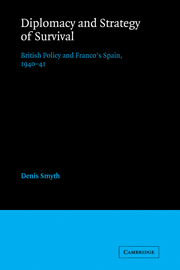Book contents
- Frontmatter
- Contents
- Preface
- Introduction
- 1 Britain and and the birth of Franco's Spain, 1936–39
- 2 Defining a policy
- 3 Opposition
- 4 The Spanish scene
- 5 Strategic diplomacy: September–October, 1940
- 6 Economic diplomacy: September–December, 1940
- 7 The Tangier crisis
- 8 The limits of attraction
- 9 The exhaustion of diplomacy
- Conclusion
- Notes
- Bibliography
- Index
- Frontmatter
- Contents
- Preface
- Introduction
- 1 Britain and and the birth of Franco's Spain, 1936–39
- 2 Defining a policy
- 3 Opposition
- 4 The Spanish scene
- 5 Strategic diplomacy: September–October, 1940
- 6 Economic diplomacy: September–December, 1940
- 7 The Tangier crisis
- 8 The limits of attraction
- 9 The exhaustion of diplomacy
- Conclusion
- Notes
- Bibliography
- Index
Summary
On 30 October 1940, Colonel-General Franz Halder, Chief of the German Army's General Staff, had a discussion with his staffintelligence officer, General Kurt von Tippelskirch, and the German Military Attaché in Madrid, Colonel Walter Bruns, about the Spanish situation. Halder was told of the many cleavages which had already appeared in Franco's Civil War coalition. The Army and the Carlists were opposed to the young Falangists, as were the older Falangists. Serrano Suñer was supported only by the young members of the Falange and by Franco. Halder was further informed that Franco's Spain was riven with antagonisms, social dissensions being the sharpest, and nowhere could the renewal of old, or the emergence of new forces be discerned. The very cumbersome title of Francoist Spain's only party, the Falange Española Tradicionalista y de las Juntas de Ofensiva Nacional-Sindicalista (F.E.T.) reflected its hybrid composition. The main institutional groupings in the 1937 merger were the fascist-style Falange and the Carlist Traditionalists, inveterate enemies of modernity. If they were unlikely political partners, they were increasingly joined by even more bizarre associates as more and more Republican territory fell to Franco in the Civil War, and membership of the F.E.T. seemed the only way for ex-anarchists, communists, socialists and democrats to avoid the bloody Nationalist revenge in the conquered zones.
- Type
- Chapter
- Information
- Diplomacy and Strategy of SurvivalBritish Policy and Franco's Spain, 1940-41, pp. 72 - 83Publisher: Cambridge University PressPrint publication year: 1986

